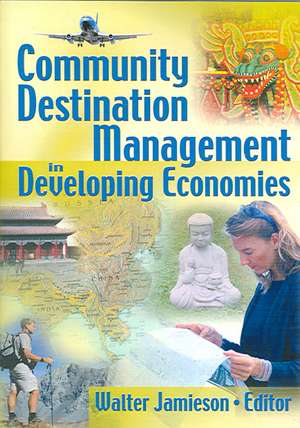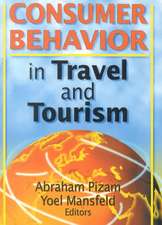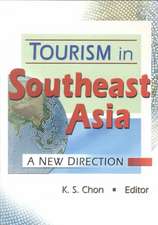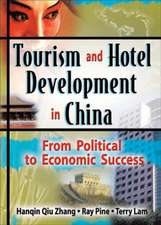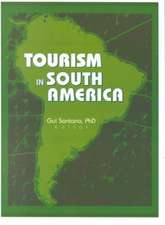Community Destination Management in Developing Economies
Autor Kaye Sung Chon, Walter Jamiesonen Limba Engleză Paperback – 16 mai 2006
Community Destination Management in Developing Economies is a user-friendly guide that provides a comprehensive view of the issues facing planners, policymakers, and destination managers who attempt to ensure a sustainable future for community destinations in developing economies. Travel and tourism experts from a wide range of disciplines discuss illustrative case studies and effective practical approaches for various facets of destination management. This book explains in detail the complex task of destination management, making the needed basic knowledge and skills understandable to all readers.
Community Destination Management in Developing Economies is divided into three sections. The first section provides a basic introduction to community tourism destination management with a special emphasis on community participation and practical case studies. The second section reviews the basic tools essential for managing destinations, such as Environmental Impact Assessments (EIA), Geographic Information Systems (GIS), remote sensing technologies, good governance, and carrying capacity. The final section provides a wide range of illuminating case studies designed to illustrate both the conceptual issues discussed in the first part along with the tools developed in the second part. The book is extensively referenced and has several helpful figures, tables, and photographs to clarify concepts and topics.
Community Destination Management in Developing Economies topics include:
- the principles of sustainable tourism
- product marketing and development
- financing
- destination planning
- organizational structure and management
- destination site management and operations
- the nature of tourism
- participation of the community in development projects
- Environmental Impact Assessments (EIA)
- Geographic Information Systems (GIS)
- remote sensing technology
- historic resource management
- the concept and application of good governance
- carrying capacity as a destination management tool
- preservation of heritage in tourism
- computer visualization technology
- festival and event tourism
- and more!
Preț: 368.15 lei
Preț vechi: 534.41 lei
-31% Nou
Puncte Express: 552
Preț estimativ în valută:
70.45€ • 72.15$ • 58.61£
70.45€ • 72.15$ • 58.61£
Carte tipărită la comandă
Livrare economică 19 martie-02 aprilie
Preluare comenzi: 021 569.72.76
Specificații
ISBN-13: 9780789023872
ISBN-10: 0789023873
Pagini: 216
Dimensiuni: 148 x 210 x 14 mm
Greutate: 0.34 kg
Ediția:1
Editura: Taylor & Francis
Colecția Routledge
Locul publicării:Oxford, United Kingdom
ISBN-10: 0789023873
Pagini: 216
Dimensiuni: 148 x 210 x 14 mm
Greutate: 0.34 kg
Ediția:1
Editura: Taylor & Francis
Colecția Routledge
Locul publicării:Oxford, United Kingdom
Cuprins
About the Editor Contributors Preface and Acknowledgments Introduction Chapter 1. Defining Urban Tourism Destination Management (Walter Jamieson) What Is Sustainable Tourism? Principles of Sustainable Tourism Product Marketing and Development Destination Planning Organizational Structure and Management Destination Site Management/Operations Conclusion Chapter 2. The Nature of Urban and Community Tourism (Geoffrey Wall) The Importance of Tourism The Nature of Tourism Tourism Experiences Tourism in Urban Areas Stakeholders Why Tourism? High Stakes Summary and Conclusions Chapter 3. Community Participation in the Royal Development Projects (Panthep Klanarongran) Introduction Royal Principles for Social Development and Community Participation Royal Development Projects and Their Objectives The Royal Development Study Centers Examples of Community Participation Educational Development-Oriented Tourism Conclusion Chapter 4. Community Planning for Tourism Development: Klong Khwang Case Study, Nakhon Ratchasima Province, Thailand (Pawinee Sunalai) Introduction The Tourism Planning Process of Klong Khwang The Tourism Plan Management Challenges Conclusion Chapter 5. Cumulative Impact Assessment of Hotel Development in Siem Reap, Cambodia (William A. Ross) Introduction Preliminary Environmental Impact Assessment of Hotel Development Conclusion Chapter 6. Interpretation and Tourism (Walter Jamieson) Introduction Interpretation and Heritage Planning for Interpretation Conclusion Chapter 7. GIS, Remote Sensing, and Tourism Destination Management (Richard M. Levy and Elizabeth E. Dickson) Introduction Tourism Destination Management and Building Consensus Historic Resource Management GIS/RS and Biophysical Planning Issues Conclusion: GIS and Decision Support Chapter 8. Good Governance in Destination Management (Willi Zimmermann) Introduction Public Participation in Tourism Management Planning Principles Conclusion Chapter 9. Carrying Capacity As a Tool for Tourism Destination Management (Pallavi Mandke) Introduction Concepts and Issues Related to Carrying Capacity in Tourism Carrying Capacity As a Tool of Tourism Management Implementing Carrying Capacities Monitoring Indicators Conclusion Chapter 10. Singapore’s “Tourism Unlimited” and Transport Infrastructure Management (Anthony T. H. Chin) Introduction Transport Infrastructure Development Conclusion Chapter 11. Urban Environmental Tourism Destination Management: Phimai Case Study, Nakhon Ratchasima Province, Thailand (Pawinee Sunalai) Introduction Tourism Situation of Phimai Management Issues for Phimai City Suggested Strategies to Improve Phimai’s Urban Environment Management Issues for Phimai Historic Park Management Issues for Phimai National Museum Conclusion Chapter 12. Managing Urban Heritage Resources Within a Cultural Tourism Context (Walter Jamieson) Introduction Heritage Resource Management Issues The Nature and Purpose of Urban Districts/Community Heritage Sites Urban Heritage Sites and District Management Techniques Developing a Site Management Plan Elements of a Heritage Site Management Plan Conclusion Chapter 13. Computer Visualization and
Descriere
Community Destination Management in Developing Economies is a user-friendly guide that provides a comprehensive view of the issues facing planners, policymakers, and destination managers who attempt to ensure a sustainable future for community destinations in developing economies. Travel and tourism experts from a wide range of disciplines discuss illustrative case studies and effective practical approaches for various facets of destination management. This book explains in detail the complex task of destination management, making the needed basic knowledge and skills understandable to all readers. The book is extensively referenced and has several helpful figures, tables, and photographs to clarify concepts and topics.
